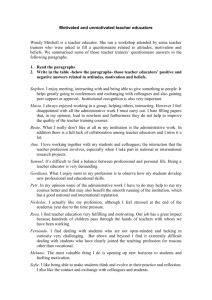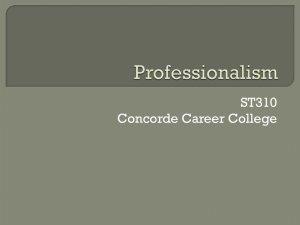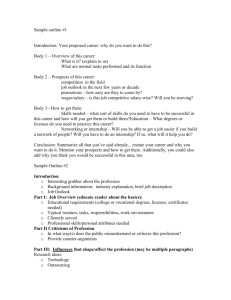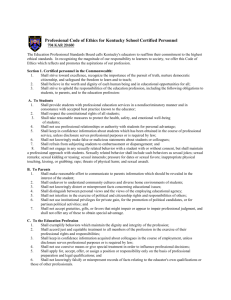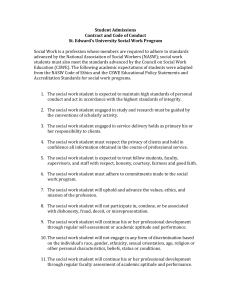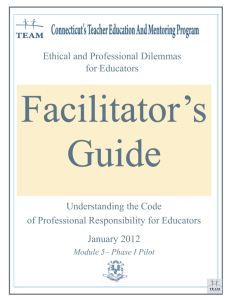Morality within the Context of Code of Conduct and Ethics
advertisement
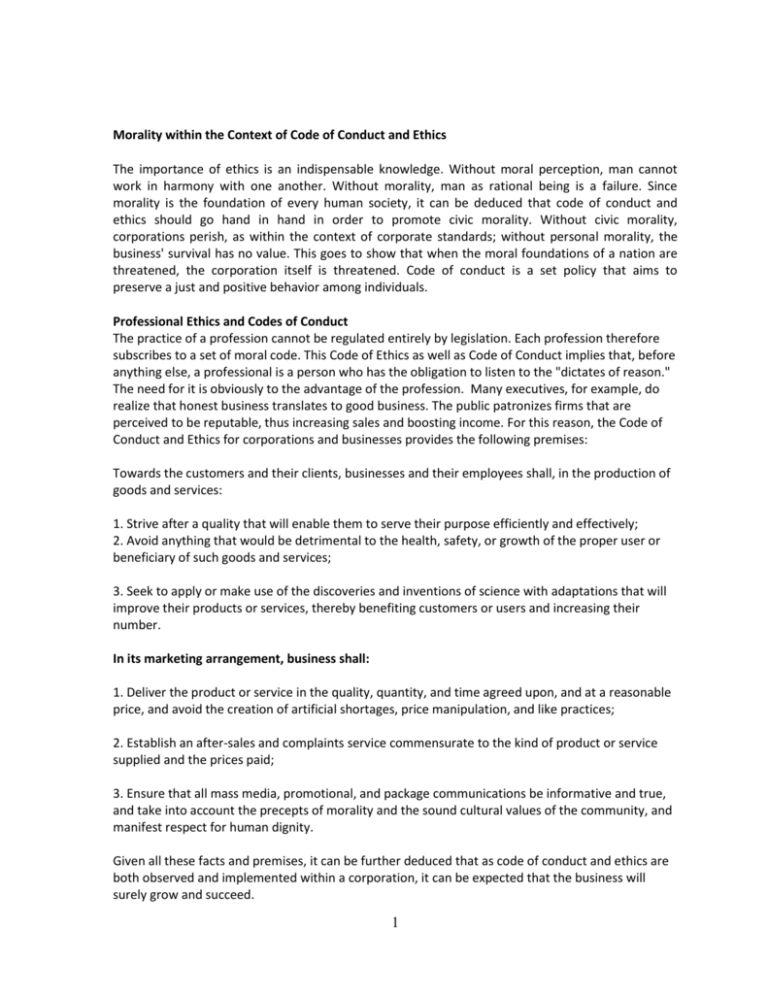
Morality within the Context of Code of Conduct and Ethics The importance of ethics is an indispensable knowledge. Without moral perception, man cannot work in harmony with one another. Without morality, man as rational being is a failure. Since morality is the foundation of every human society, it can be deduced that code of conduct and ethics should go hand in hand in order to promote civic morality. Without civic morality, corporations perish, as within the context of corporate standards; without personal morality, the business' survival has no value. This goes to show that when the moral foundations of a nation are threatened, the corporation itself is threatened. Code of conduct is a set policy that aims to preserve a just and positive behavior among individuals. Professional Ethics and Codes of Conduct The practice of a profession cannot be regulated entirely by legislation. Each profession therefore subscribes to a set of moral code. This Code of Ethics as well as Code of Conduct implies that, before anything else, a professional is a person who has the obligation to listen to the "dictates of reason." The need for it is obviously to the advantage of the profession. Many executives, for example, do realize that honest business translates to good business. The public patronizes firms that are perceived to be reputable, thus increasing sales and boosting income. For this reason, the Code of Conduct and Ethics for corporations and businesses provides the following premises: Towards the customers and their clients, businesses and their employees shall, in the production of goods and services: 1. Strive after a quality that will enable them to serve their purpose efficiently and effectively; 2. Avoid anything that would be detrimental to the health, safety, or growth of the proper user or beneficiary of such goods and services; 3. Seek to apply or make use of the discoveries and inventions of science with adaptations that will improve their products or services, thereby benefiting customers or users and increasing their number. In its marketing arrangement, business shall: 1. Deliver the product or service in the quality, quantity, and time agreed upon, and at a reasonable price, and avoid the creation of artificial shortages, price manipulation, and like practices; 2. Establish an after-sales and complaints service commensurate to the kind of product or service supplied and the prices paid; 3. Ensure that all mass media, promotional, and package communications be informative and true, and take into account the precepts of morality and the sound cultural values of the community, and manifest respect for human dignity. Given all these facts and premises, it can be further deduced that as code of conduct and ethics are both observed and implemented within a corporation, it can be expected that the business will surely grow and succeed. 1 No system of power can replace morality, which is necessary in any human society than what code of conduct and ethics can do. Golden rules to Professional code of conduct The workplace is a home away from home where individuals build, nurture and sometimes even end relationships. It is not surprising to know that most important deals that are to remain within confide doors are laughed upon over a cup of coffee in the cafeteria by juniors because of the strong grapevine that floats in companies. Most times the employees become so comfortable with what is happening around them that they become lazy and start detesting change. A workplace must be a place that talks about professionalism in all fronts. It must be a place where every employee feels safe, respected, and responsible for his acts and feel secure. An organization is made of different kinds of people with different nature. At times what one would like the other would not. A topic might not be offending for one but might be the biggest embarrassing factor for the other. Since it is always difficult to identify and draw a line, its best to avoid certain topics altogether. The golden rules of professional code of conduct must be designed to help employees avoid behavior that might be looked down upon by the others. Rules of professional code of conduct: Respect for all: The minimum professional behavior expected from employees is to respect all who work n the company, irrespective of the level they are in. Respect difference of opinion: Since no two employees are the same. Hence, they must keep their egos out of the office premise and respect the other one's point of view. Comply to policies and procedures: The best example to share would be the in and out log time. To depict professional behavior employees must depend full eight to nine hours in the office. Only take scheduled breaks Contribute qualitative on productivity. Behave within the legal boundaries of the professional code of conduct. Avoid all topics related to religion, especially when he has a team of heterogeneous mix. Must not voice his opinion in public about what he does not like about the organization. The best way would be to go the grievance department and settle it theirs. Avoid all assorts of sexual harassment conducts like 1. Commenting and looking at someone or his/her specific body parts. 2. Commenting about sexual activity 3. Getting gender different in the organization and spoiling the atmosphere 4. Narrating adult and sexual jokes Be helpful to co-workers Must come well dressed to the office & must comply to all kinds of etiquette Must not over commit to the cuter and under deliver both in terms of quality and against time. Must stay away from Eve and Adam teasing and overhearing of conversations Must not share passwords and comply to other security norms Must never sell company information to outsiders. 2 No fraudulent related to past experience, past salary package and generation of fake bills Every employee must be trained on corrective and preventive actions that can have an alarming effect not only on him but also on the organization he/she works for. Professional Responsibility for Educators Preamble The Code of Professional Responsibility for Educators is a set of principles which the education profession expects its members to honor and follow. These principles set forth, on behalf of the education profession and the public it serves, standards to guide conduct and the judicious appraisal of conduct in situations that have professional and ethical implications. The Code adheres to the fundamental belief that the student is the foremost reason for the existence of the profession. The education profession is vested by the public with a trust and responsibility requiring the highest ideals of professionalism. Therefore, the educator accepts both the public trust and the responsibilities to practice the profession according to the highest possible degree of ethical conduct and standards. Such responsibilities include the commitment to the students, the profession, the community and the family. Consistent with applicable law, the Code of Professional Responsibility for Educators shall serve as a basis for decisions on issues pertaining to certification and employment. The Code shall apply to all educators holding, applying or completing preparation for a certificate, authorization or permit or other credential from the State Board of Education. For the purposes of this section, "educator" includes superintendents, administrators, teachers, special services professionals, coaches, substitute teachers and paraprofessionals. Responsibility to the Student: The professional educator, in full recognition of his or her obligation to the student, shall: (a) Recognize, respect and uphold the dignity and worth of students as individual human beings, and, therefore, deal justly and considerately with students; (b) Engage students in the pursuit of truth, knowledge and wisdom and provide access to all points of view without deliberate distortion of content area matter; (c) Nurture in students lifelong respect and compassion for themselves and other human beings regardless of race, ethnic origin, gender, social class, disability, religion, or sexual orientation; (d) Foster in students the full understanding, application and preservation of democratic principles and processes; (e) Guide students to acquire the requisite skills and understanding for participatory citizenship and to realize their obligation to be worthy and contributing members of society; (f) Assist students in the formulation of worthy, positive goals; (g) Promote the right and freedom of students to learn, explore ideas, develop critical thinking, problem solving, and necessary learning skills to acquire the knowledge needed to achieve their full potential; (h) Remain steadfast in guaranteeing equal opportunity for quality education for all students; 3 (i) Maintain the confidentiality of information concerning students obtained in the proper course of the educational process, and dispense such information only when prescribed or directed by federal or state law or professional practice; (j) Create an emotionally and physically safe and healthy learning environment for all students; and (k) Apply discipline promptly, impartially, appropriately and with compassion. Responsibility to the Profession: The professional educator, in full recognition of his or her obligation to the profession, shall: (a) Conduct himself or herself as a professional realizing that his or her actions reflect directly upon the status and substance of the profession; (b) Uphold the professional educator’s right to serve effectively; (c) Uphold the principle of academic freedom; (d) Strive to exercise the highest level of professional judgment; (e) Engage in professional learning to promote and implement research-based best educational practices; (f) Assume responsibility for his or her professional development; (g) Encourage the participation of educators in the process of educational decision-making; (h) Promote the employment of only qualified and fully certificated, authorized or permitted educators; (i) Encourage promising, qualified and competent individuals to enter the profession; (j) Maintain the confidentiality of information concerning colleagues and dispense such information only when prescribed or directed by federal or state law or professional practice; (k) Honor professional contracts until fulfillment, release, or dissolution mutually agreed upon by all parties to contract; (l) Create a culture that encourages purposeful collaboration and dialogue among all stakeholders; (m) Promote and maintain ongoing communication among all stakeholders; and (n) Provide effective leadership to ensure continuous focus on student achievement. Responsibility to the Community: The professional educator, in full recognition of the public trust vested in the profession, shall: (a) Be cognizant of the influence of educators upon the community-at-large; obey local, state and national laws; (b) Encourage the community to exercise its responsibility to be involved in the formulation of educational policy; (c) Promote the principles and ideals of democratic citizenship; and (d) Endeavor to secure equal educational opportunities for all students. Responsibility to the Student Family: The professional educator in full recognition of the public trust vested in the profession shall: (a) Respect the dignity of each family, its culture, customs, and beliefs; (b) Promote, respond, and maintain appropriate communications with the family, staff and administration; (c) Consider the family’s concerns and perspectives on issues involving its children; and (d) Encourage participation of the family in the educational process. 4 UNPROFESSIONAL CONDUCT*: The professional educator, in full recognition of his or her obligation to the student, shall not: (a) Abuse his or her position as a professional with students for private advantage; (b) Discriminate against students; (c) Sexually or physically harass or abuse students; (d) Emotionally abuse students; or (e) Engage in any misconduct which would put students at risk; and The professional educator, in full recognition of his or her obligation to the profession, shall not: (a) Obtain a certificate, authorization, permit or other credential issued by the state board of education or obtain employment by misrepresentation, forgery or fraud; (b) Accept any gratuity, gift or favor that would impair or influence professional decisions or actions; (c) Misrepresent his, her or another’s professional qualifications or competencies; (d) Sexually, physically or emotionally harass or abuse district employees; (e) Misuse district funds and/or district property; or (f) Engage in any misconduct which would impair his or her ability to serve effectively in the profession; and The professional educator, in full recognition of the public trust vested in the profession, shall not: (a) Exploit the educational institution for personal gain; (b) Be convicted in a court of law of a crime involving moral turpitude or of any crime of such nature that violates such public trust; or (c) Knowingly misrepresent facts or make false statements. * Unprofessional conduct is not limited to the descriptors listed above. When in doubt regarding whether a specific course of action constitutes professional or unprofessional conduct please seek advice from your school district or preparation institution. 5
